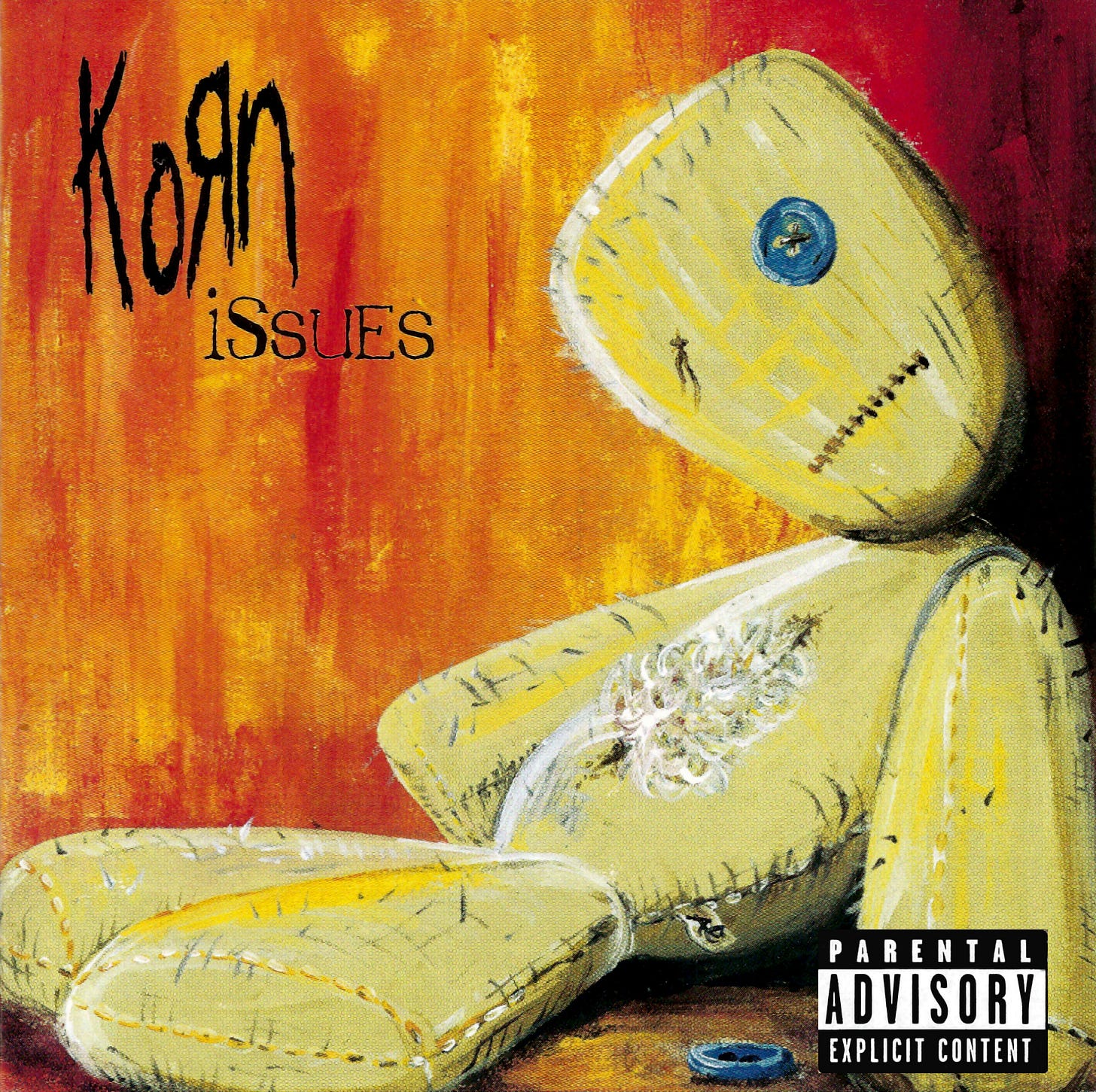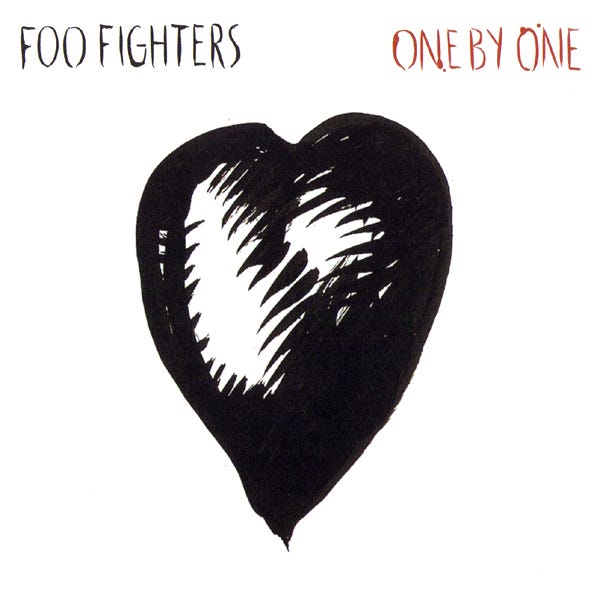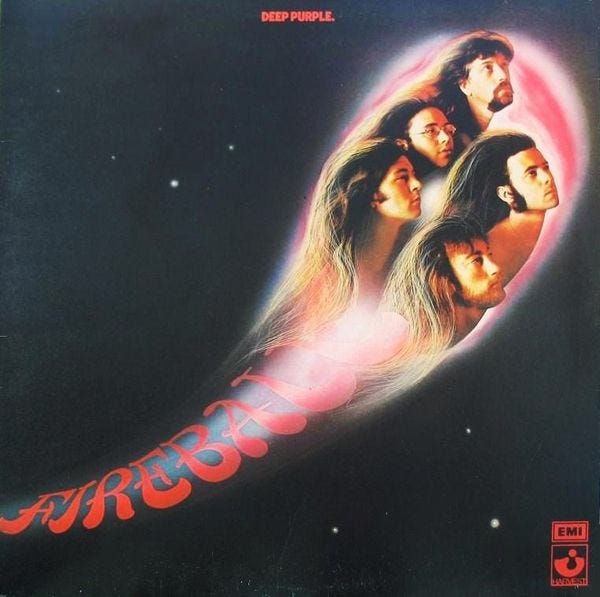Reports of their demise having been a least a little premature, long-running digital music publication and Condé Nast portfolio stocking stuffer Pitchfork have spent the last two weeks publishing their collected thoughts on the 2020s thus far. These thoughts have taken the form of two lists, one for the best songs of the young half decade, another for albums, and an on-going series of essays about specific trends and scenes. The songs list dropped while ~*My Girlfriend*~ and I were resting in Kalamazoo, Michigan. When we drove to Chicago the next day we threw it on in the car and made it through the top 30 or so songs before we reached our apartment. As we unpacked I scrolled through the rest of the list. I had one question on my mind: “What about the riffs, dude?” I should know better. I’ve read Pitchfork lists like this since 2005 and I’ve always left thinking “there could have been a little more metal”. I shouldn’t get my hopes up, but it’s October 11th and The Mets are still playing baseball, so why not be optimistic? Besides, years of prospecting for metal gems in these mountainous lists have taught me to better appreciate their rarity. The scant few metal songs that appear in Pitchfork’s year and decade evaluations offer us a glimpse of how the wider music culture views heavy music.
As I expected hardcore fared much better than the long-hair stuff. Turnstile made predictable appearances on both lists and were joined by Soul Glo’s excellent Diaspora Problems on the album list. Diaspora Problems is one of the best albums of the 2020s. Turnstile’s Glow On is one of the *most* 2020s albums of the 2020s. Metal on the other hand had only one selection per list. Blood Incanation’s Hidden History of the Human Race clocked in at 95 on the albums list while Chat Pile made it to 74 on the song list with “Why”. My response to both of these selections was a prolonged “hmmmm”. I wasn’t confused, necessarily. Both bands are quite popular among people that write about music and in the guitar music underground generally. These are bands that score well even on metal-only lists. They’re in rare company. Yet that these two were selected from that company offered a surprising image of what Pitchfork expects of heavy metal in the 21st century.
Before I spool out what that image is, there are a few minor nits that I’d like to pluck out first. Yes, it is a little embarrassing that the only metal album on a list of the best albums of the current decade is from 2019. As a late November release, Hidden History was likely too late to qualify for any 2010s roundups, which in turn makes it eligible for the 2020s. But seriously, is the genre so barren of creativity that we have to only include it on the basis of a technicality? Again, I’m not saying that Blood Incantation aren’t worthy of representing the genre, and hey if FKA Twigs’ masterpiece Magdalena is also being looped in from Q4 of 2019 then you might as well hitch a ride, but let’s not pretend that the optics aren’t bad for the genre as a whole. As long as we’re talking about optics it’s worth noting that when Pitchfork published these two lists both Blood Incantation and Chat Pile had new albums on the horizon. Both albums, Absolute Elsewhere and Cool World, are out now and have already earned critical buzz. I’m not accusing anyone of publicity collusion, but it definitely didn’t hurt any of the parties involved to have both bands included on these lists.
Now onto the meat of the matter. What does the presence of “Why”, the second track from Chat Pile’s 2022 album God’s Country, on the song list say about heavy metal? This question raises a whole host of other smaller questions. Are Chat Pile even a metal band? Is “Why” even the best song on God’s Country? Is the presence of a metal song this high on the list even worth remarking on? What about all the other metal songs from the last five years??
Let me tackle that last one first. I’m not here to debate whether Chat Pile “deserve” to be here. I’ve got no beef with those guys. I know at least one member of the band is a fellow member of the Action Button Goblin Bunker Discord channel, and that suggests that we’d probably get along just fine if we met IRL. I’m not even really concerned with the quality of “Why” qua “Why”. Interpreting its high score doesn’t require me to like the song. So while I could spend the next few paragraphs suggesting alternatives (what about Sonja????) for the sake of our collective blood pressure let’s skip the fantasy booking and take Chat Pile’s victory as a given. This is an easy step to take if you accept that the purpose of a list like this is to sum up a period of time in a way that captures what happened, what mattered, and what was worth paying attention to. Let’s not harbor any illusions that a compiled list like this can make firm claims about what the “best” music is. It is an assessment of vibes organized to stoke conversations and make the internal metrics people happy. Don’t get twisted up by the presentation.
Before we can assess how Chat Pile’s chart performance rates in Pitchfork’s history the band must first pass the Gatekeeper’s Crucible: Are they actually a metal band? I mean… maybe? That we have to ask alone qualifies them for Pitchfork approval. Your mom would certainly say so, unless you have a very particular kind of mom. Stop a random person on the street, play them 30 seconds of “Why” and they’d probably call it death metal. It’s got loud guitars and a man screaming, that’s enough for most people. Hunt down passersby in black t-shirts and the answers will get complicated. The folks at Nü-Metal Agenda embraced Chat Pile as one of their own, but that distinction works against them in stricter hesher circles. The Flenser, Chat Pile’s current record label, aren’t exactly a metal label but they do release enough metal to move the needle. You could mount an argument that Chat Pile are more of a noise rock band than a metal one. “Why” is certainly structured more in that idiom, where songs follow the increasing agitation of their lead singers, than the metal riff-centric model. But with metal bands like Pyrrhon blurring the lines into noise rock from the other direction it’s hard to disqualify Chat Pile on that basis. In the end, and in the absence of any real competitors on the list, I’m happy to award Chat Pile the dubious honor of real metal.
As far as Pitchfork are concerned “Why” is, relative to its era, one of the best metal songs ever. In my research I only found one metal song that ranked higher on decade or half decade list: Deafheaven’s “Dreamhouse”. “Dreamhouse”, which made it all the way to 54 on the 2010s So Far list, makes for a pretty good foil for “Why”. I’ll get more into that soon. When Pitchfork tackled the 2010s as a whole, Sleep’s “Marijuanaut’s Theme” topped out at 172. Pitchfork’s 2000s summary featured no metal bands at all, although it does feature songs from the other side of Chat Pile’s family tree by Fugazi (186), Shellac (172) and Mclusky (86). Pitchfork are more generous to metal-adjacent tunes in their coverage of decades further in the rearview. Their 1990s list featured other Chat Pile precursors like Refused’s “New Noise” (it’s a nü-metal song) at 245, Korn’s “Freak on a Leash” at 234, Alice in Chains’ “Would?” at 226, and Rage Against The Machine’s “Killing in the Name” at 118. Metallica’s closing pitcher anthem “Enter Sandman” rounds out the metal appearances at 179. Heavy metal does best on Pitchfork’s 1980s list, written in 2015. This list features classics that even the gatekeepiest among us would have to acknowledge like Suicidal Tendencies’ “Institutionalized” (174), Motorhead’s “Ace of Spades” (136), Slayer’s “Angel of Death” (84), and Metallica’s “Master of Puppets” at (77). There are also some Guns’n’Roses songs, but c’mon. That puts “Why” in conversation with the biggest names in metal history. Nice job, boys!
But why? Why is “Why” so high?
Pitchfork’s best answer to this question comes instead from their blurb for Blood Incantation’s Hidden History. Sam Goldner positions Hidden History against the previous decade when
…it seemed like every metal band had to have some kind of elevating affixation on the genre in order to cross over—everything was either “-gaze” this or “post-” that—it was starting to feel like metal as a whole was on a long campaign to apologize for itself.
Compared to this metal version of respectability politics, Blood Incantation are “proudly absurd”. The blurb highlights the scuzzier parts of Blood Incantation’s music, the psychedelic passages, the (from what I’ve heard) completely sincere interest in ancient alien kookery, etc. In short, Pitchfork’s taste in metal has shifted from metal that actively flatters the hipster sensibility toward metal that confirms its expectations of metal culture from the outside. Blood Incantation and Chat Pile both represent a switch from coffee house, graphic designly, metal aesthetes to gas station frequenting, tie-dyed, burn out weirdos. This vibe shift was well underway in the metal underground by the time the 2020s began, but it’s accelerated since the start of the pandemic. The most popular death metal bands are now the ones that embrace the sonic trappings of the early 90s as well as its period-appropriate Beavis & Butthead worthy persona. Nü-metal, long derided for its obnoxious “low class” crassness, has finally been re-legitimized as an essential part of metal history and a foundational influence on Gen Z guitar music.
“Why” is the perfect bridge between Pitchfork 2010s vision of metal and it’s present one. Like Deafheaven’s Sunbather it is animated by class anxiety. Instead of cloaking those feelings in a mix of erotic desire and bittersweet, longing melodies, Chat Pile put things as bluntly as possible. “Why do people have to live outside? We have the resources” they ask. This is not music interested in nuance or poetry. It is a pure expression of aggravation and disgust, pointedly inarticulate and out of control. Moreover, the music sounds like it too lives outside. “Why” allows Pitchfork to acknowledge the nü-metal revival without lowering themselves to write about bands that think Deftones play shoegaze. “Why” isn’t the best song on God’s Country, that’d be the slower, prettier “Anytime”, but it is the most memetic, the most confrontational, and the most straightforward. Pitchfork isn’t looking for erudite, tasteful compositions from heavy metal. They want that dumb stuff (complimentary). This preference isn’t exclusive just to heavy music. Did you notice that the word “edgelord” showed up as a positive descriptor twice in blurbs for the top 10 songs? Anyone still operating under the belief that Pitchfork are playing by Poptimism’s tenets of presentability are fooling themselves. The sleeze is back, baby.
# # # # # The Self Promo Zone # # # # #
I have good news! I just entered into a new shared practice space in Chicago where I can store my drums, practice with bands, and resume my ongoing project to film myself playing every song I’ve ever Liked on Spotify on drums. This is exciting enough as is, but after I crunched the numbers I learned that I am only three paid subscribers away from covering my practice space costs entirely with this Substack! Wow! That would be a huge milestone on my journey to make Drumming Upstream pay for itself. If three loyal readers sign up for a paid subscription this week, I promise to record a drum cover chosen by & exclusively for my paying subscribers. Thank you all for your continued support!
~ ~ ~ ~ ~ Listening Diary ~ ~ ~ ~ ~
Here are five songs that I enjoyed listening to recently! You can find a Spotify playlist with all of this year’s tracks here, updated with a new song every Monday-Friday.
“Previsão Do Tempo” by Marcos Valle (Previsão Do Tempo, 1973)
I checked this out on the strength of the Tone Glow interview with Valle and the subsequent Tone Glow interview with Geordie Greep. That is some effective editorial calendar work! This record scored the stretch between Indiana and Michigan when the weather started to improve just a little. Instant add to my “Hypothetical Bond Songs” playlist.
“American TTerroristt” by RXKNewphew (Crack Therapy 3, 2020)
All other notes on the Pitchfork list aside, putting this track in the top 5 was the right move. If the aim was to capture the mood of 2020, you couldn’t pick a better track to put that high. Endlessly quotable (“how the FUCK y’all know Jesus’ birthday?”), utterly unhinged, part invective against a deterministic universe, part trap lord pragmatism, asking good questions and offering bad answers, nothing else to call this except inspired.
“Bôdas de Sangue” by Marcos Valle (Vento Sul, 1972)
Another Valle instrumental. Not that I have anything against his vocal tunes! This track has some very adventurous chord choices and features a dramatic build up that might be familiar to fans of early 2010s mainstream rap. I love that the strings sound a little out of tune. They don’t clash against the other instruments and they’ve got just the right amount of character to them.
“Vilna” by Weidorje (Weidorje, 1978)
Shouts out to Wolf Rambitz’s latest at Stereogum about the encroaching influence of Zeuhel on heavy metal. As anticipators of my long-gestating treatise on “Progmatism” can imagine Rambitz’s observation is right up my alley. I’ll admit that Zeuhel, the avant-garde French response to British prog, has always been a little too prickly even for me. Even the most “out” prog bands usually still gesture at the idea of playing rock songs. Zeuhel bands on the other hand are out on the edge with no safety nets. Thrilling stuff when it works! This band are a lot friendlier than most of the Zeuhel groups I’ve heard, no off-putting sex cult vibes here, just sick bass grooves and endlessly shifting leads.
“Jimi’s Headband” by Rome Streetz (Hatton Garden Holdup, 2024)
Shouts out to Walt, who probably doesn’t read this newsletter, for alerting me to the new Rome Streetz tape. I’d been a little burnt out on the whole Griselda aesthetic, but these lyrics are undeniable.
\ \ \ \ \ Micro Reviews / / / / /
Here are five micro reviews from my high school and college collection of burnt CDs. Long time Lamniformes Instagram followers will recognize these from my stories back in 2021, however they’ve been re-edited and spruced up with links so that you can actually hear the music instead of just taking my word for it.
You Are There by Mono (2006) - Post Rock
I saw this band opening for Pelican without knowing a thing about them in 2006 and left in stunned silence at how good they were. Instrumental post rock played with the highest degree of dynamic melodrama. This is the second album they recorded with Steve Albini. When it comes to the “crescendo core” style of post rock, this might be my personal favorite. They really mastered the slow build and apocalyptic payoff. This album also has their single most beautiful set of melodies on the closing track “Moonlight”.
Issues by Korn (1999) - Nü-Metal
When it comes to SoCal funk rock lunkheads, Korn are more my speed than RHCP. This is their “suffering from success” record, where it is clear that making it big has not made their problems go away and only heightened their internal tensions. This has Korn’s sharpest songwriting top to bottom. I think they released something like five singles for this record, and all of them are good. The mood-setting interludes show the band expanding their range, which bleeds into the arrangement choices of the other tracks. Jonathan Davis’s lyrics are, hmm, an acquired taste, but if you are game this is the best of Korn’s discography.
One by One by Foo Fighters (2002) - Rock
“All My Life” was everywhere on rock radio when I was 12 and at the edge of a Nirvana phase, so checking out the extended Grohl universe was inevitable. I have no idea where this one stands in the arc of their discography. Obligatory complaint about 2000s compression. Once you get past that though this is totally fine radio rock. Some neat guitar tones, I like the one on the closing track. Grohl is an above average post-grunge bellower. Nothing to write home about, but solid.
Literate Te Ex Inferis by Zao (1999) - Metalcore
Christian metalcore band hears Neurosis, collectively loses mind. This album had a mythological aura around it for me as a teen. I found its eschatological pessimism super dark. It seemed like the only Christian record I’d heard that treated the concept of damnation with appropriate horror and seriousness. Really, really good. Scares me way less these days, of course. The Event Horizon samples are a great touch. Their singer’s voice remains one of the freakiest in all of heavy music. Essential metalcore imo.
Fireball by Deep Purple (1971) - Rock
Of all the big classic rock bands, I have the weakest grip on Deep Purple. I know this record is from the period where they had two different dudes named Ian in the band, which is pretty cool if you ask me. Organ-led blues rock with an absolute goofball on vocals. Horny in a very British way. The second half gets a bit more drugged out, drags on. Not that into it.








